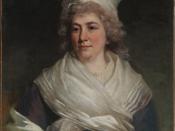The societal expectations of women in the 18th century mirrored America's hope for a prosperous republic. It was a macrocosm microcosm effect, when if there were chaos inside the home due to women's actions, there would be a sense of chaos in the nation. Starting from how women were expected to present themselves in physical demeanor to how they were expected to speak, there were strict outlines of natural behavior for women to be considered civil.
Women were expected to be physically present and intellectually absent. In any matter that entailed a great deal of importance men were naturally the ones to decide the outcomes of our fate. Franklin believed that men, and only men, were expected to present themselves to be aware of issues facing the new nation and always actively participated in ways to solve any problems that may have existed. Women on the other hand were not even thought of in political matters instead their role in the construction of a new nation was their journey towards motherhood.
This leads to the matters of courtship and how extreme these cases could become. In social gatherings people would expose the person that they wanted to expose. This is not a case that is only seen in this time period, however because people had such provincial mindsets when viewing civil virtue and being proper, one's outer self became increasingly distinguishable from one's true self. On top of this fact, a woman's parents greatly influenced the process of courtship. Suitors that the woman truly did like may not have fallen so kindly in favor with her parents and if her parents believed another man was better suited for her then she was expected to comply with her parent's wishes. Benjamin Franklin states, "That generally when a young man found himself dispo'd to marry, he inform'd the elders of his class, who consulted the elder ladies that govern'd the young women...they could best judge what matches were suitable." Parents and elders decided who would marry who and it would not be left up to the women and men choosing to choose one another.
Up and coming mothers in the rising republic of American were expected to be beautiful and obedient to they point where it could be said that it was almost a relationship that could have existed between slave and master. In a letter from Boyer to Eliza the standards for women are set, "there is a levity in your manners, which is inconsistent with the solidity and decorum becoming a lady who has arrived to years of discretion." Franklin believed that women should be well educated, however the majority of Americans did not believe that this was prudent. Most people expected that women be educated enough to be intellectually present to the point that they could start helping teach to children at home, but any further education was cause for suspect. Even women who read too often were looked down upon since it was assumed they were reading genres of fiction and romance novels and not texts that would be deemed proper by religious standards.
A new genre was romantic novels were geared towards women in this time period. The romantic novel flourished among your women and probably exposed some deep and dark desires that women had inside of them to be free of the social stigmas that bound them. The only problem with this was a woman could not support herself alone in the 18th century, and this free and fancifulness could lead to bastard children. Not only could a woman not support a fatherless child but also she would basically be outcast from any possibility of marrying a suitor. Men and Women were expected to have their children born at least a full year after their marriage.
In the Coquette by Hannah Foster, Elizabeth was the woman that was the antithesis of what society expected. She wanted to explore the realms of romance and dreams and did not consider the repercussions that would come due to her actions. When Eliza writes to her friend Lucy about how she feels about Boyer asking her to marry him, "I recoil at the thought of immediately forming a connection, which must confine me to the duties of domestic life, and make me dependent for happiness, perhaps too, for subsistence, upon a class of people, who will claim the right of scrutinizing every part of my conduct." She was expected to be discrete as a woman but her desires clouded her judgment and drove her to take what she wanted which was another man who only used her for his pleasures. In the end she is without a husband and is alone. Even though this book may have touched upon the darker corners of women's hearts in the end these actions are scolded and proved to be unfitting from women in this century.
For the success of the developing nation women did not play the most important part but rather reflected the state of the heart of the nation. The women were expected to be out of the picture intellectually but present physically. It is said that behind every great man there's a great woman and in this case great women were thought to be obedient and supporting of their husbands who would run the nation. And in this way the actions of women reflected the manor in which the way the home was, and this in turn mirrored the developing of a nation.






